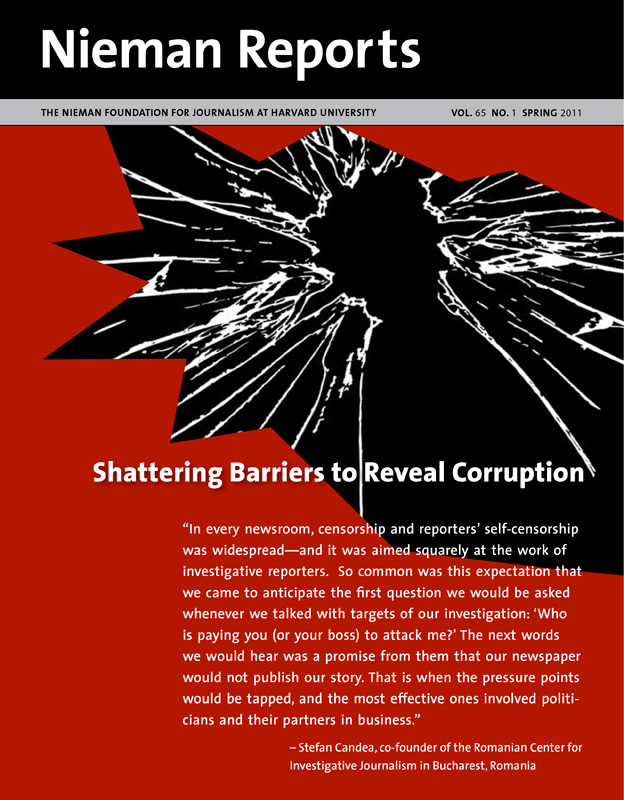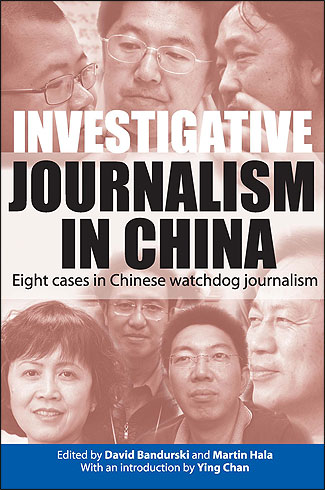In her introduction to a book about investigative journalism in China, Ying Chan traces the progress and setbacks of news reporting under Communist rule, a history that has actually seen some hard-hitting stories published in government organs.
The book, “Investigative Journalism in China: Eight Cases in Chinese Watchdog Journalism,” was edited by David Bandurski and Martin Hala and published in 2010 by Hong Kong University Press.
Ying Chan identifies a number of themes in her brief history of journalism in the Communist era, including the pioneering role that party media, especially on the national level, have played in investigative reporting. China Youth Daily, the flagship newspaper of China's Communist Youth League, and the China Economic Times, published by a policy think tank of China's State Council, are among the party newspapers that have published noteworthy investigations.
Typical of the Chinese government's seesawing between openness and censorship is the case study that looks at reporting on the government's cover-up of SARS in 2003. Caijing, one of China's leading business and current affairs magazines, RELATED ARTICLE
“Chinese Journalists Circumvent Government's Tight Restrictions”
- Ying Chanrebuffed by officials in its quest to cover the story, divided its reporting staff into three groups and sent each out on a mission. One group went from hospital to hospital, the second focused on the scientists investigating the origins of SARS, and the third examined legal questions, such as those surrounding China's Quarantine Law.
Caijing published four special issues about SARS. In one of them, writers and scholars suggested that SARS, as the book states, "presented a historic opportunity for China to learn from its experience and move more confidently toward reform." RELATED ARTICLE
“China's Propaganda Department: New Restrictions on the Press”Yet hopes that the nation's leaders would do so were dashed when the Central Propaganda Department decided—just as Caijing was preparing the last of its special issues on SARS—to clamp down on the media. In many ways, the book continues, the SARS case "signaled the beginning of the present-day debate over access to information in China," with party leaders forced to come to grips with the "extraordinary costs of secrecy."
The book, “Investigative Journalism in China: Eight Cases in Chinese Watchdog Journalism,” was edited by David Bandurski and Martin Hala and published in 2010 by Hong Kong University Press.
Ying Chan identifies a number of themes in her brief history of journalism in the Communist era, including the pioneering role that party media, especially on the national level, have played in investigative reporting. China Youth Daily, the flagship newspaper of China's Communist Youth League, and the China Economic Times, published by a policy think tank of China's State Council, are among the party newspapers that have published noteworthy investigations.
Typical of the Chinese government's seesawing between openness and censorship is the case study that looks at reporting on the government's cover-up of SARS in 2003. Caijing, one of China's leading business and current affairs magazines, RELATED ARTICLE
“Chinese Journalists Circumvent Government's Tight Restrictions”
- Ying Chanrebuffed by officials in its quest to cover the story, divided its reporting staff into three groups and sent each out on a mission. One group went from hospital to hospital, the second focused on the scientists investigating the origins of SARS, and the third examined legal questions, such as those surrounding China's Quarantine Law.
Caijing published four special issues about SARS. In one of them, writers and scholars suggested that SARS, as the book states, "presented a historic opportunity for China to learn from its experience and move more confidently toward reform." RELATED ARTICLE
“China's Propaganda Department: New Restrictions on the Press”Yet hopes that the nation's leaders would do so were dashed when the Central Propaganda Department decided—just as Caijing was preparing the last of its special issues on SARS—to clamp down on the media. In many ways, the book continues, the SARS case "signaled the beginning of the present-day debate over access to information in China," with party leaders forced to come to grips with the "extraordinary costs of secrecy."




